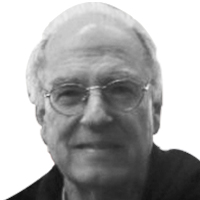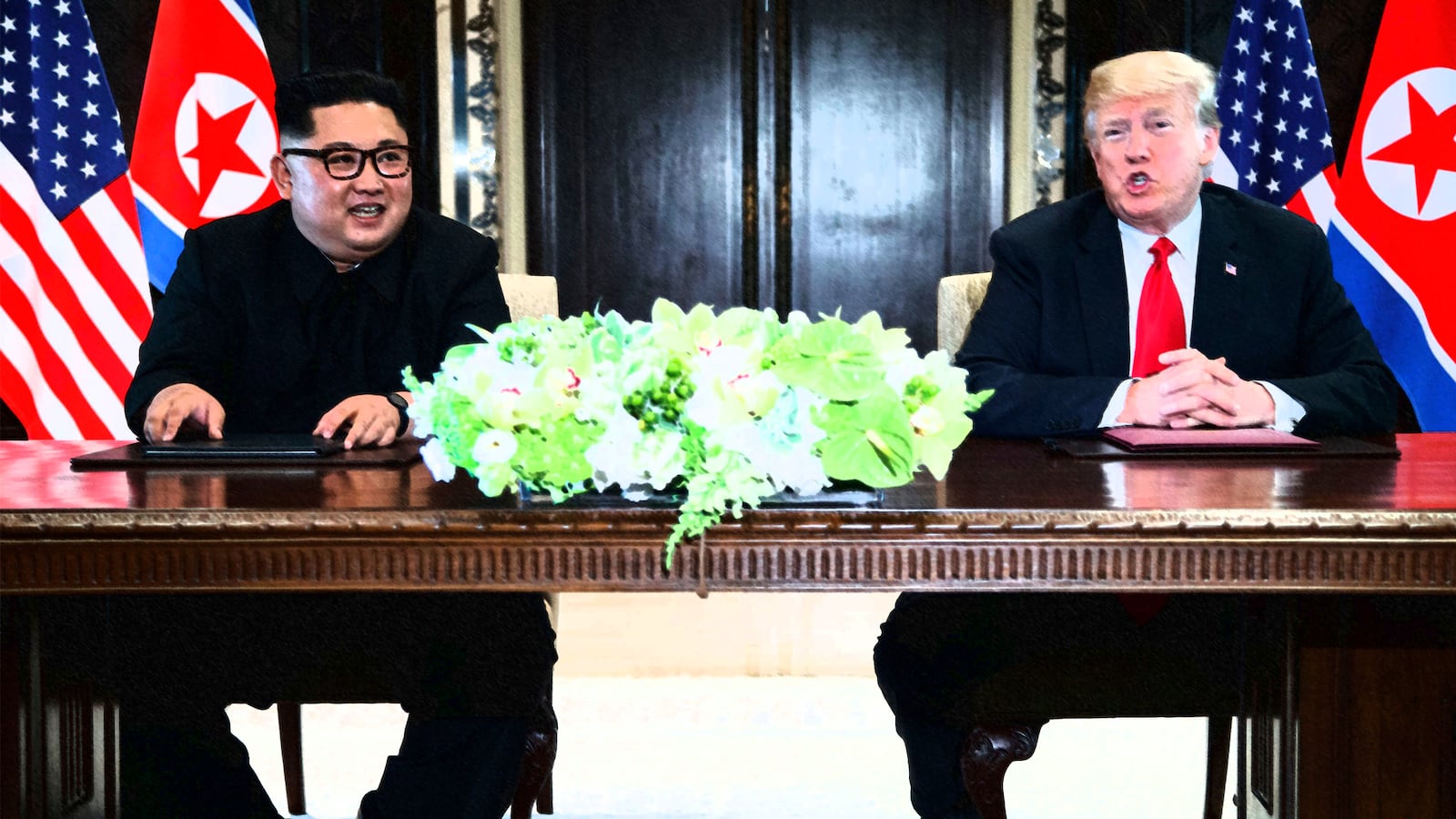SEOUL – Return of the remains of GIs killed in the Korean War is bound to be a sad and moving spectacle, and the North Koreans know well the emotional strings they’re pulling as they haggle over handing back the bodies, or remnants of bodies, of as many as 200 soldiers previously listed as missing in action.
President Donald J. Trump has been a collaborator in the charade at least since the June 12 Singapore summit when he proudly claimed to have talked Kim Jong Un into incorporating return of remains as the fourth and last point of the brief statement that both of them signed. "The remains will be coming back," he boasted in the rambling press conference he staged a few hours later. “They're going to start the process immediately."
Maybe he thought that was true. Or maybe he just thought his faithful followers would believe it. In Duluth, Minnesota, at one of his political pep rallies more than two weeks ago, he announced that the North Koreans already had returned 200 sets of remains.
Nope. That hadn’t happened and hasn’t happened. And on Thursday, when a team from the U.N. Command including U.S. officers showed up at the truce village of Panmunjom fully primed to meet a North Korean team to discuss details about the return of remains, the North Koreans stood them up.
Probably the most significant moment of the U.N. delegation’s wait in one of the buildings on the North-South line, in what is known as the "Joint Security Area," was that the North Koreans actually bothered to call on a "hot line" they haven't used for years. The message: they wanted talks not just between colonels on either side but between generals.
So now the negotiations are on for Sunday – the first between U.S.and North Korean generals in nine years. And the emphasis on rank suggests just how vital the North Koreans see the whole issue of remains. They hope to use it to warm the hearts of South Koreans and Americans alike at a time when the “denuclearization” negotiations show no public signs of progress.
Assuming the meeting on Sunday does happen, it will stand as the lone substantive dividend of Secretary of State Mike Pompeo's embarrassing nine hours of talks in Pyongyang last weekend with the North's shrewdest, toughest negotiator, Kim Yong Chol, vice chairman of the Workers' Party (under Chairman Kim) and one-time intelligence chief of the North's military machine.
For the North Koreans, haggling over the return of the remains is a smart move. "It seems to be part of the NK game plan for using the talks and the purported existence of American remains to entice the U.S. and to press Washington to make concessions," Evans Revere, former deputy chief of the U.S. mission in Seoul, said in an email. “Doing it at the general-officer level adds to the drama. North Korea has used American civilians as de facto hostages in recent years to demonstrate how it has the upper hand and to put the United States in the position of the supplicant. Pyongyang is now doing this with the remains of deceased American service members.”
At this stage, it's not quite clear how many remains will be returned, whether the North will want to send them back in batches or whether it will also demand or at least suggest the need for more concessions from the Americans.
"It's become so bizarre," said Stephen Tharp, who attended the handover of remains on a number of occasions during his long career as an army officer. "They'll say they've got this many remains. We have no idea what that means."
In fact, in 2005 as the war of words between the U.S. and North Korea worsened, U.S. officials grew increasingly uneasy about security and pulled out of the search for remains after nearly a decade of "joint recovery operations.” The number of remains returned up to that time came to 629 out of 5,300 American soldiers listed as missing in North Korea during the war that ended 65 years ago this month when the armistice was signed at Panmunjom.
The Americans steadfastly refuse to pay for remains, but they did sign an agreement in 1993 to pay the North Koreans $892,000 in "expenses" for joint recovery expeditions. Pyongyang certainly will be asking for payment this time, but that’s not all, in the view of those who’ve been following the drama for years.
“Yeah. I think it is about money,” said Victor Cha, a Georgetown professor who focused on Korea while with the national security council during the presidency of George W. Bush, “but the generals may say other stuff, too.”
It’s that “other stuff” that will consume the energies and emotions of the generals as they haggle over the bones of GIs who perished in long ago battles unremembered and unknown to most Americans. The Korean War, with no clear victory to be proclaimed, remains largely forgotten. But as Trump seems to have believed since his days on the campaign trail, the North Koreans agree, returning the remains of MIAs, giving closure to their descendants, is a goodwill gesture that will help underscore Pyongyang’s desire for a formal declaration of peace.
Toward that end, the North Koreans have South Korea’s President Moon Jae-in on their side. “The goal of our government is to declare an official end of the Korean War this year,” said Moon in an interview with a newspaper in Singapore while visiting there this week. Such an agreement, he said, would “provide a milestone to the process for permanent peace along with denuclearization and a peace treaty between North and South.”
The Americans may see such talk as a ruse to weaken the U.S.-South Korean alliance and bring about withdrawal of America’s 28,500 troops, but they are reluctant to say so. Meanwhile, they wonder what the North Koreans will do next to get around demands they eliminate their nukes and missiles. With Trump playing the remains as a matter of paramount importance to American families who lost loved ones in the Korean War, the North Koreans know they’re playing a strong hand.
“The North Koreans are taking their time as return of remains is what Trump wants badly, not the North Koreans,” said Shim Jae Hoon, a veteran commentator for the Far Eastern Economic Review and Yale Global. They’re playing “the waiting game until Washington comes up with one or more concessions, such as a declaration of the end of conflict – another stepping stone for negotiating the withdrawal of American troops.”
The return of remains is not always a political event. Friday, U.S. and South Korean commanders stood with bowed heads while military bands played the national anthems of both countries – and taps for two soldiers, one a South Korean, the other an American.
The South Korean had died in North Korea, killed north of Pyongyang. His remains were returned years ago along with the those of Americans and only after extensive forensic examination was he determined to be Korean. In fact, DNA analysis even confirmed his precise identity.
Typically, remains are flown to Hickam Air Base in Hawaii where the Defense POW/MIA Accounting Agency is responsible for examining whatever is left to see. It’s a process to which all the remains are subjected — and may well reveal that not all the remains the North Koreans have indicated they’ll return actually are American.
At the ceremony on Friday there was no doubt about the American there, who had died in one of the bloodiest battles of the war in the mountainous central region below what is now the Demilitarized Zone and was found by a South Korean search team.
The ceremony was at the Korean National Cemetery. It was an ending that the Americans are planning to reenact for the remains, eventually, of scores more American whom the North Koreans are holding hostage in the cold and calculating process as they play on the politics of Trump and the yearning of Moon for reconciliation at last.






